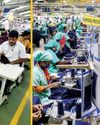
The World Bank began classifying its member countries based on per capita gross national income (GNI) at constant prices (taking away the influence of changes in price level) for the purpose of concessional lending The GNI is defined, as total income earned by a nation’s people and businesses, including investment income, regardless of where it was earned. It also covers money received from abroad such as foreign investment, inward remittances and economic development aid. There are four categories based on ranges of average per capita GNI as follows:
(i) Low income
(ii) Low middle income
(iii) Upper middle income
(iv) High income
These classifications and income limits are updated every three years. The latest announcements categorizing the World Bank member countries are of July 2023 for FY 2024 in US dollars.
Table 1 shows the ranges of the four categories.
Table 2 shows average per capita GNI for India as well as other Indian subcontinent neighbors and Southeast Asian countries.
Nepal is classified as the only low-income country in the Indian subcontinent. All other five subcontinent countries are low middle income countries. In Southeast Asia, no country is in the low-income category. All other countries are low middle income countries except Malaysia. Malaysia is in the upper middle country, with a current per capita income (GNI) of $11,830. Singapore in South East Asia, is the only country, which is generally known as developed or advanced country at a high average per capita income ($67,353).
Malaysia is expected soon to graduate to become a highincome country from the upper-middle income class, when its average per capita income is expected to hit 13,386 in 2027.
Many people are wondering when India would become a high income country.
Denne historien er fra June 01 - 30, 2024-utgaven av BUSINESS ECONOMICS.
Start din 7-dagers gratis prøveperiode på Magzter GOLD for å få tilgang til tusenvis av utvalgte premiumhistorier og 9000+ magasiner og aviser.
Allerede abonnent ? Logg på
Denne historien er fra June 01 - 30, 2024-utgaven av BUSINESS ECONOMICS.
Start din 7-dagers gratis prøveperiode på Magzter GOLD for å få tilgang til tusenvis av utvalgte premiumhistorier og 9000+ magasiner og aviser.
Allerede abonnent? Logg på

Bank of Baroda, Kolkata Zone organised Mega Kisan Melas in West Bengal
Bank of Baroda (BOB) organised Mega Kisan Mela at Konkalitala in Birbhum District of West Bengal on November 18, 2024 as a part of the 7th Edition of the Baroda Kisan Pakhwada (BKP).

Time-Bound Disposal of Cases to Expedite the Delivery of Justice and affordabe by all in India
The delay in the disposal of cases in Indian courts remains a significant hurdle to the nation's progress.

Dev Deepawali: A grand celebration of light, spirituality, and culture in Varanasi
The holy city of Varanasi, often regarded as India's spiritual and cultural heart, came alive with the splendor of Dev Deepawali on the sacred day of Kartik Purnima.

The life of Job 'Ye judge not the judgment of God' - Jesus Christ
The Holy Bible reveals through the life of Job how the Lord tests the righteous and that faith helps one to overcome life's adversities.

India has the highest potential for the garment industry, only a conducive government policy is required.
India's textile industry is poised for remarkable growth, with expectations to double its contribution to the GDP within the next six to seven years.

Global Public Debt may be worse than it appears, warns IMF
Global Public Debt Set to Exceed $100 Trillion, Warns IMF

The economic consequences of Trump's Presidency: A global perspective
One of the key economic factors contributing to the Democrats' loss in the US elections was the significant rise in inflation, which was initially triggered by the COVID-19 pandemic and exacerbated by the Russia-Ukraine war.

Challenges and Successes in West Bengal's Education Sector: A Comprehensive Overview
The education system in West Bengal, particularly in districts, villages, slums, and government institutions, reflects a blend of progress and ongoing challenges.

What India can expect from Trump's return
I may be too early to predict how Donald Trump's second term as president will impact the global oil market.

Stocks Surge Following Donald Trump's Election as 47th President of the USA
Stocks soared following the election of Donald Trump as the 47th President of the United States. Investors anticipated that the Information Technology (IT) sector would benefit from lower corporate taxes under the Republican regime, with IT stocks leading the rally.